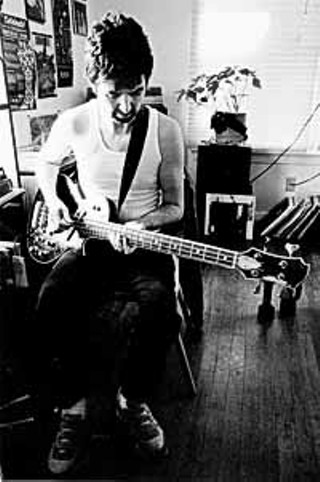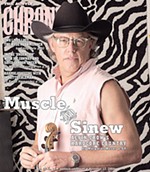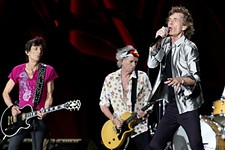Here Comes the Nice
Small Face Ronnie Lane's Big Splash in Austin
By Christopher Gray, Fri., Dec. 8, 2000

Ronnie Lane, despite never achieving the same level of stateside fame as his friends Pete Townshend, Eric Clapton, and Jimmy Page, was no less one of the seminal figures in the early years of the British Invasion. A co-founder of both the Small Faces and later the Faces, Lane enjoyed a colorful UK solo career in the Seventies, and finally succumbed to a long battle with multiple sclerosis on June 4, 1997. During most of the intervening years, he called Austin home. The new album Live in Austin, due out Tuesday on Portland, Oregon indie label Sideburn Records, contains material culled from Lane's only recordings as an adopted Texan.
Lane was born in 1946 in London's East End, and was a pop star before he turned 20. The Small Faces, the group the bassist, singer, and songwriter started with singer/guitarist Steve Marriott, drummer Kenney Jones, and keyboardist Jimmy Winston (soon replaced by Ian McLagan), first hit the charts in October 1965 with "Whatcha Gonna Do About It." The succession of singles that followed -- "All or Nothing," "Here Comes the Nice," "Itchycoo Park" (the band's lone U.S. hit), "Tin Soldier," "Lazy Sunday," "Afterglow" -- made them household names and teen idols as their music evolved from Mod-ish R&B stylings to kaleidoscope-eyed psychedelia.
"The Small Faces became Mods almost before they became a band," one scenester told British music magazine MOJO in 1997.
Marriott eventually left the Small Faces to form Humble Pie with, among others, a young guitarist named Peter Frampton. Lane, McLagan, and Jones, meanwhile, hooked up with former Jeff Beck Group guitarist Ron Wood to indulge their mutual love of American proto-funk groups like Booker T & the MGs and the Meters. Soon after, Jones invited young rooster-haired singer Rod Stewart to join -- which Lane, then handling the vocal duties, resented -- and the Faces were born.
Nearly as famous for their offstage antics as their mind-melting live shows (their 1999 Rhino anthology is called Good Boys ... While They're Asleep), the Faces achieved a degree of success the Small Faces did not, albeit more in the live arena than on the charts. Among their young Yank fans were future Austinites Jody Denberg, Ed Mayberry, Kent Benjamin, and Alejandro Escovedo. Others who ate up their taut, electrified blues included Pauls Westerberg and Weller, Oasis' Noel Gallagher, the Georgia Satellites, and the Black Crowes.

Increasingly annoyed by Stewart's putting his mushrooming solo career ahead of the group, Lane split from Faces not long after their fourth LP, Ooh La La (which went to No. 1 in England), came out in 1972. The title track would later become Lane's signature composition and appears twice on Live in Austin. Estranged from the music business, Lane bought a sheep farm in Wales and took up shepherding. In an amusing story on the Live in Austin outtakes disc -- being considered for release as a second volume, The Texas Years -- Lane tells how a boisterous ram, a gift from Eric Clapton, busted out of the barn and had his way with a number of local ewes.
Missing his former love, Lane continued to write music and formed the group Slim Chance. Quoted in MOJO, Faces biographer John Pidgeon credits Lane with having "created something unique in British music: a genuine form of native country music -- no capitals, no inverted commas, just music that came out of the country and couldn't conceivably be created anywhere else."
Having long viewed himself as a modern gypsy troubadour, Lane decided to act on those impulses and concocted The Passing Show, a caravan-style assortment of various entertainers that turned into a financial fiasco. Bucolic-themed albums such as One for the Road were better received by Lane's family and friends than the record-buying public, and an attempt to reunite the Small Faces after "Itchycoo Park" re-charted in 1976 fell through.
Calling on old friend Pete Townshend for help, the two collaborated on Townshend's first solo album, 1977's Rough Mix. Lane's worsening physical condition -- originally blamed on too much drink -- was becoming apparent to everyone, and he was soon diagnosed with multiple sclerosis, the disease that also felled his mum. Indirectly, it was his struggle with MS that led him to Texas; first Houston, then Austin.
Multiple sclerosis is a nervous-system disorder marked by inflammation and scarring of a tissue in the brain and spinal cord called myelin, which protects the nerve fibers underneath. Common symptoms include loss of mobility, fatigue, numbness, slurred speech, and visual problems. The Multiple Sclerosis Foundation Inc. estimates that MS currently afflicts more than 350,000 Americans. Lane sought all manner of treatments for his condition, including snake-venom injections in Florida and a hyperbaric oxygen chamber.
For their part, Lane's friends were more than willing to help out, and a number of them -- Clapton, Page, Beck, Steve Winwood, Bill Wyman, and Charlie Watts, to name a few -- performed at a 1983 concert at London's Royal Albert Hall to raise money for Great Britain's ARMS (Action Research into Multiple Sclerosis) charity. Their efforts were quite successful, to the tune of $1 million.

A U.S. branch of ARMS was established, overseen by Houston attorney Mae Nicol. Nicol successfully convinced Lane to move to Houston, but the American ARMS soon collapsed in a snarl of accusations, lawsuits, and finger-pointing over how the money was spent. At a benefit at Houston club Fitzgerald's, Lane met Jo Rae DiMenno, who now runs Austin's Hard Pressed Publicity. Then doing PR for the club, DiMenno interviewed Lane ("my musician friends were in awe," she says) and the two hit it off. DiMenno says she could tell right away Lane wasn't doing so well.
"He was really pretty bad off when I met him," she says. "His complexion was white and pasty. He didn't look healthy at all -- one of his eyes was turned in. He didn't seem to be able to do a lot."
With DiMenno's help, Lane sought out an Iowa doctor named Robert Soll, who had written a book detailing how food allergies can exacerbate the disease. DiMenno says the results were "amazing -- he'd work out for like an hour or two a day, which he'd never done in his whole life." Lane and DiMenno moved to Austin with the help of Chesley Milliken, onetime manager of Stevie Ray Vaughan, then managing Manor Downs. Milliken had met Lane in the late Sixties as general manager of Epic Records' European branch, and "joined the epic madness that was Small Faces in Europe.
"I told him he'd be a lot better off [in Austin] than that godawful Houston," says Milliken. "They came up and stayed in my house, then they got their own place."
Lane was a lot better off in Austin. For one thing, Central Texas' relative lack of humidity -- at least compared to Houston -- helped ease his physical discomfort. He also found a community of musicians, deejays, and clubgoers who were genuinely thrilled to have a bona fide, if somewhat unsung, legend in their midst. Tops on the list were KLBJ deejays Jody Denberg and Ed Mayberry and then-True Believer Alejandro Escovedo, who says he used to follow the Faces up and down the California coast. When Lane moved to Austin, he got a chance to get even closer, becoming part of a reconstituted Slim Chance.
"If you can imagine playing on your favorite baseball team, that's what it was like," explains Escovedo. "He always made me feel good about life in general."

Denberg and Mayberry also became fast friends with Lane, interviewing him several times for the radio. Denberg went a step further and convinced Lane to join him onstage with his band the Seven Samurai at the Continental Club, a show then-Chronicle music writer Michael Corcoran named as one of the year's best. The warm reception Lane was afforded prompted him to begin gigging around town; one of his highest-profile gigs came when he, the True Believers, and former Television guitarist Richard Lloyd burned the house down at the 1988 Austin Music Awards.
"He was a romantic in every sense of the word," recalls Denberg. "It's in his music; his direct spirit is in every one of those songs."
"[Playing with Lane] solidified everything I thought music should be," testifies Escovedo. "Simplicity, space, a lot about phrasing and tempo. His music had a lot of soul to it."
The list of local musicians who performed with Lane speaks for itself: Escovedo, J.D. Foster, Jon Dee Graham, Susan Voelz, Dave Crawford, Bruce Hughes, R.C. Banks, Freddie Krc, Mary Hattersley, Don Harvey, and Rich Brotherton. This is hardly a complete list; Kent Benjamin's Live in Austin liner notes point out that Lane played with between seven and nine different lineups during his Austin years. Live in Austin draws generously from a KUT Live Set Lane recorded in September 1988 with Brotherton, Banks, Voelz, Hattersley, drummer Darren Hess, and bassist Ronnie Johnson.
Johnson was also a member of local band the Tremors, who backed Lane and Rolling Stones saxophonist Bobby Keys at a May 1987 gig at the Back Room that resulted in the Live in Austin tracks "You're So Rude," "Chicken (No Balls at All)," and "Winning With Women." Lane was hardly a stranger to the Stones, recording 1977's Ronnie Lane's Slim Chance at Mick Jagger's Star Grove country estate; Jagger dedicated "Little Red Rooster" to Lane from the Cotton Bowl stage in 1989 -- perhaps as a way of thanking him for his uncredited backup vocals (with Townshend) on Sticky Fingers' "Can't You Hear Me Knockin'." Lane's famous friends paying their respects was as regular as the mail.
"We'd go meet Jimmy Page, Stevie Nicks ..." Denberg recalls. "I can't count the number of times a song was dedicated to him from an Austin stage."

For Valentine's Day 1987, Mayberry produced a special that featured Lane calling up some of his friends and getting them to make requests. Among those he got on the line were Clapton (who wanted to hear "Wonderful Tonight"), Page, Beck, Townshend, McLagan, Bill Wyman, Joe Ely, and former Faces producer Glyn Johns. He also read the weather report, which made it onto Live in Austin along with a snippet of his and McLagan's conversation.
"Page was in the recording studio, as was Townshend, but they dropped everything to talk with him," Mayberry remembers. "Clapton was in the middle of eating fish and chips at home. Beck had just finished helping Mick Jagger with his second solo album in Barbados. We woke up Wyman, who was asleep on an office sofa. They all loved talking with Ronnie."
Due to his illness, Lane was unable to perform for most of the Nineties. He stayed in Austin until 1995, when he and third wife Susan (Denberg was best man at the wedding, with Benjamin acting as cameraman) moved to her small hometown of Trinidad, Colorado, where he spent his final two years. Half a decade later, Lane's Austin friends and bandmates remember him fondly, and as DiMenno puts it, "wish he was still here."
"Ronnie was a dear, sweet, naive (in an endearing way -- he trusted just about everybody), feisty, funny, stubborn, and lovely man," she says. "I feel lucky to have known him."
"Ronnie was just one of the funniest, most entertaining folks you could ever meet," notes Benjamin.
"Kevin Connor [then at Z102] played a George Harrison song and said, 'George Harrison kinda sounds like you,'" says Freddy Krc. "Ronnie said, 'Poor old George.'"
"We would have great laughter in his company all the time," reflects Chesley Milliken. "You can be in a lot of people's company and there's not too much laughter, but in his there always was. He was a gutsy little guy."
"Every Austin musician who was ever around Ronnie felt his bright outlook for music and expression," says Ed Mayberry, who named his second son Ronnie Lane Mayberry. "They always wanted to play their best for him."
"He just had a loving gleam in his eye," muses Denberg. "He really was a beautiful guy. He'd been through it all, yet he remained grounded in who he was."
"He had a rich spirit," says Escovedo. "He was one of those guys like Doug Sahm -- it was very inspiring. I think about him all the time. To have held that bass he played all those years was one of the best experiences of my life." ![]()
The MOJO quotes, and much background information, are taken from the article "It's All Too Beautiful" by Wayne Pernu, which appeared in the September 1997 issue. Thanks also to Live in Austin producer Kent Benjamin, easily one of the Top 10 Small Faces fans on the planet, and to everyone else for being so generous with their time and memories.








